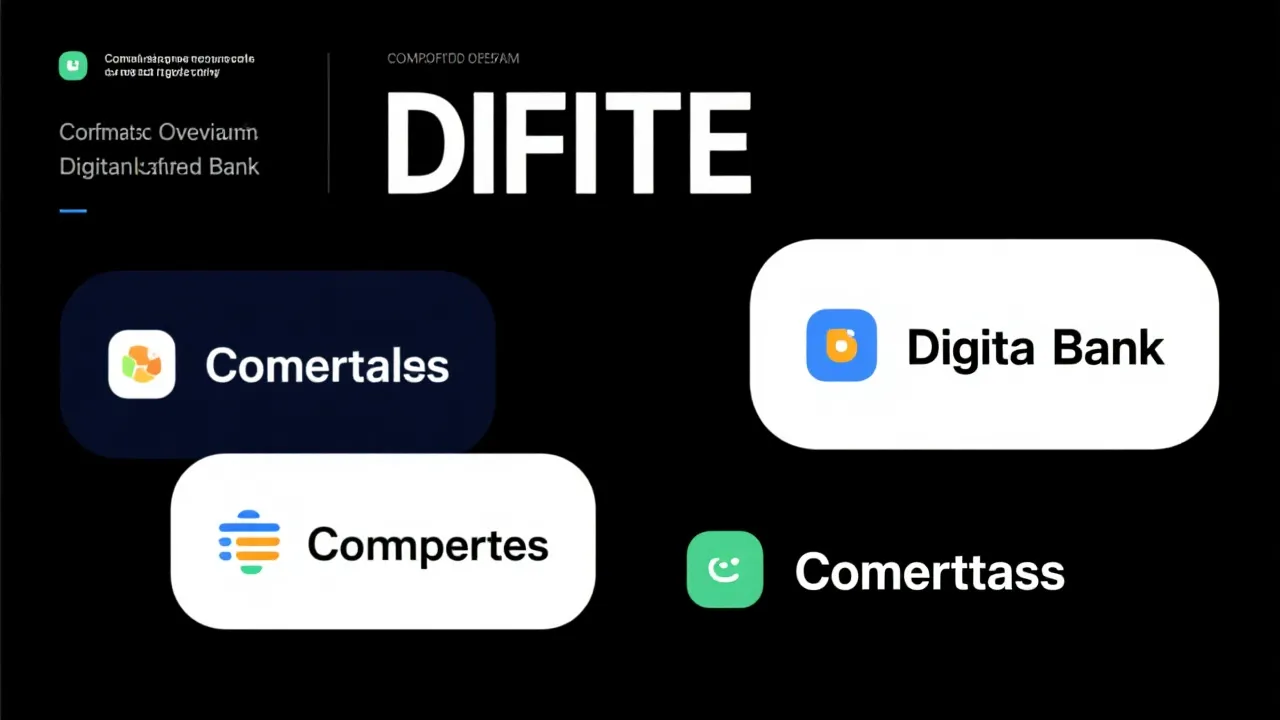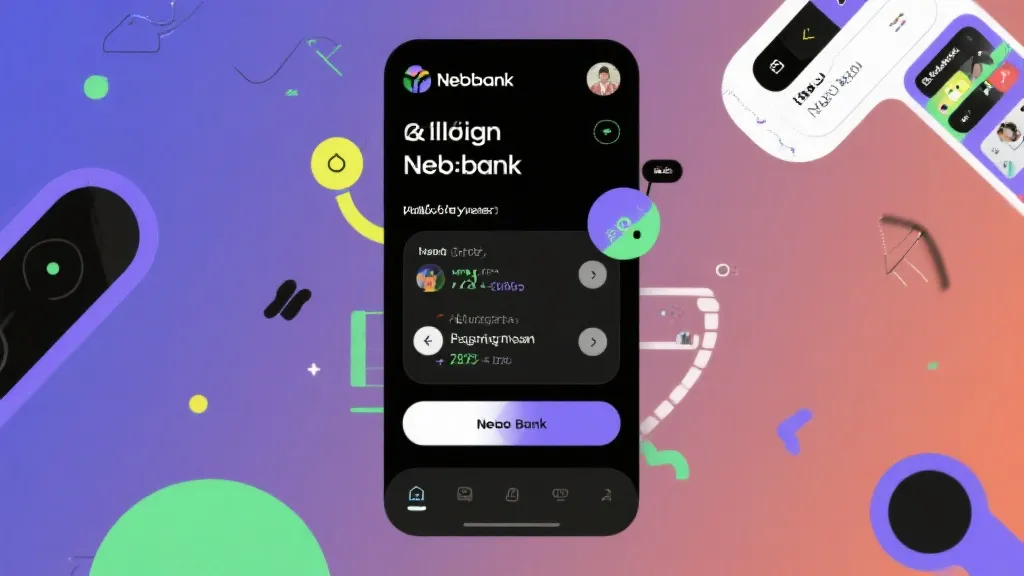This article provides an insightful analysis of Webbank's competitive landscape in the digital banking sector. Webbank operates as a significant player within the fintech industry, offering a technology-driven approach to financial services. Exploring its competitors allows for a deeper understanding of market dynamics, future trends, and strategic positioning of banks in the digital era.

In the evolving landscape of digital finance, Webbank stands out as a pioneering entity. Its success, however, is influenced by numerous competitors that drive innovation and challenge Webbank's market position. Understanding who these competitors are provides key insights into the fintech industry's dynamics. The rapid expansion of technology and the internet has fundamentally changed financial services, leading to significant disruption across traditional banking models. As digital finance expands its reach, so does the necessity for consumers to engage with these platforms.
To smoothen the competitive edge, it is crucial to acknowledge the significant players alongside Webbank. Key rivals include established entities such as Venmo, SoFi, Ally Bank, and new players like Revolut and Chime. Each of these institutions offers unique innovations that contribute to the evolving banking landscape. Understanding these players is not just essential for Webbank's positioning; it is vital for consumers looking for the best options tailored to their financial needs. Heightened competition invites a significant evolution of services, products, and customer engagement techniques.
Studying the competitive edge of these rivals shows varied strategies and operational strengths. These players differ not only in their service offerings but also in how they approach customer satisfaction and engagement. Below we delve deeper into each competitor, highlighting both their offerings and the complexities they navigate:
| Competitor | Strengths | Challenges |
|---|---|---|
| Venmo | Strong social media integration, peer-to-peer payment simplicity | Competing with parent company PayPal, regulation issues |
| SoFi | Diverse financial products, member benefits (e.g., career coaching) | Customer acquisition costs, high competition in personal finance |
| Ally Bank | Comprehensive online banking services, strong customer service | Lack of physical branches, competitive interest rates |
| Revolut | Global money transfers, multi-currency accounts | Complex regulatory environment, high customer service demands |
| Chime | Early direct deposit, no fee banking model | Revenue largely dependent on interchange fees |
The digitization of financial services presents both challenges and opportunities. Webbank and its competitors continue to leverage technology to expand their consumer bases, enhance user experiences, and innovate their product offerings. As digital banking grows, focusing on data security, customer experience, and regulatory compliance becomes paramount. Companies are investing heavily in artificial intelligence to improve personalized banking services, streamline operations, and enhance security protocols. The integration of AI into banking practices also opens avenues for predictive analytics, enabling companies to anticipate customer needs and preferences.
Furthermore, mobile banking is increasingly becoming the preferred method of managing finances for many users, particularly younger generations. Companies like Webbank are capitalizing on this trend by developing robust mobile applications that offer seamless interfaces, real-time notifications, and accessibility to various financial products. This places pressure on all banking institutions to continuously innovate their technology offerings to meet evolving consumer expectations.
The primary challenge facing Webbank's competitors is cybersecurity. As financial institutions increasingly move online, the risk of cyberattacks has escalated. Companies must allocate substantial resources to build and maintain strong cybersecurity infrastructures. Furthermore, with technological advancements also come sophisticated cyber threats, necessitating ongoing vigilance and adaptation to new threats. Regulatory compliance is another area requiring significant resources and adaptation, especially with changing rules across different jurisdictions. Strict guidelines regarding data privacy and customer protection force companies to continually update their operational procedures, often leading to increased operational costs.
Moreover, sustainability and ethical finance are growing concerns among consumers, pushing banks to incorporate green initiatives strategically. Today's consumers are more informed and conscientious about their financial choices. This trend drives many banks to implement green policies, such as offering eco-friendly investment options or supporting renewable energy projects. Not only is this crucial for preserving the planet, but it also represents an essential competitive edge in attracting environmentally-conscious consumers.
Innovation is the lifeblood of fintech, and companies must stay ahead of the curve to maintain their competitive edge. One significant trend reshaping digital banking is the move toward integrated financial solutions that go beyond traditional banking. For instance, some players are now offering comprehensive platforms where users can manage investments, savings, and loans on a single interface. This holistic approach engages customers meaningfully and makes financial management much simpler.
Additionally, features such as budgeting tools, financial literacy resources, and savings goals integrated into banking apps are becoming standard. These tools provide more value to consumers by empowering them to make informed financial decisions and achieve their monetary goals. Companies that succeed in delivering comprehensive financial education alongside their services typically experience higher customer loyalty.
As technology advances, consumer expectations will continue to evolve, further impacting how banks operate. Modern consumers demand transparency, convenience, and personalization. They expect banks to offer tailored solutions that address their unique financial circumstances rather than generic products. This shifting landscape requires institutions to invest in robust customer relationship management (CRM) systems and leverage data analytics for deeper insight into consumer behavior and preferences.
The advent of open banking is also reshaping consumer expectations. By enabling third-party financial service providers to access customer banking data (with consent), open banking fosters an environment of innovation and competition, leading to personalized financial products. This regulatory shift urges banks to prioritize creating expansive ecosystems that nurture partnerships rather than competing solely in isolation.
The competitive landscape of digital banking varies significantly across different regions, influenced by local regulations, market maturity, and consumer behavior. In Europe, for instance, the implementation of the Payment Services Directive 2 (PSD2) has accelerated the trend towards open banking, giving rise to numerous fintech startups that challenge traditional banking models. On the other hand, in emerging economies, mobile banking solutions have soared due to a significant unbanked population. Companies like M-Pesa in Kenya have transformed the financial landscape by providing basic banking services via mobile technology where traditional banking infrastructure is lacking.
These international differences highlight the necessity for companies like Webbank to employ tailored strategies that resonate with local markets. Understanding cultural nuances, regulatory impacts, and consumer behavior in targeted regions is critical for successful expansion and sustained competitive advantage.
Emerging technologies are pivotal in redefining the financial landscape. Blockchain technology, often associated with cryptocurrencies, has the potential to enhance transparency, security, and efficiency in transactions. Several banks are actively exploring the integration of blockchain into their operations to streamline processes, reduce transaction costs, and eliminate fraud risks.
Moreover, the rise of robo-advisors in investment management is reshaping how individuals approach financial planning. By leveraging algorithms and AI, these automated platforms provide affordable investment advice tailored to individual financial goals. This disrupts traditional advisory services and makes financial planning more accessible to a broader audience.
As competition intensifies, customer experience evolves into a core battleground for market share. Companies that prioritize delivering exceptional user experiences through intuitive design, efficient service delivery, and proactive support are likely to stand out. A seamless customer journey—from onboarding to transactions and customer support—is increasingly crucial in winning consumer loyalty.
Gamification is another strategy being utilized to enhance customer engagement within banking platforms. By incorporating game-like elements, banks create a more interactive and enjoyable user experience. Features could include rewarding customers for meeting savings goals or providing challenges tied to financial literacy. This not only drives engagement but also encourages better financial habits among users.
The regulatory landscape surrounding fintech companies is dynamic and complex. As governments worldwide adapt to the rapid growth of digital finance, regulations can impose constraints that either inhibit or facilitate innovation. In some regions, regulatory bodies have established "sandbox" environments where fintech companies can test products under regulatory supervision without the fear of penalties. This approach fosters innovation while ensuring consumer protection.
However, regulatory compliance also demands extensive resources, often disadvantaging smaller players who cannot bear the associated costs. Moreover, differing regulatory frameworks across countries complicate international expansion, as companies must navigate varied legal landscapes while maintaining compliance. This underscores the necessity for fintech firms to stay informed and agile concerning regulatory changes that may impact their operations.
Webbank and its competitors are shaping the future of digital banking. Their innovative efforts to meet consumer demands create a dynamic market that continuously evolves. For stakeholders within the fintech industry, understanding these elements is crucial for strategic decision-making and good success. The pace of technological advancement will continue to be a significant factor in determining which players thrive as we move into an increasingly digital future. By keeping a keen eye on consumer preferences, regulatory changes, and technological innovations, banks can craft strategies that align with the trajectory of the market.
Q: What makes Webbank different from its competitors?
A: Webbank integrates advanced technology with financial services, providing unique online banking solutions that challenge traditional models. Its focus on digital-first solutions allows it to cater to a tech-savvy clientele seeking convenience and efficiency.
Q: How do regulations impact digital banks?
A: Regulations ensure consumer protection and system integrity but can also limit rapid innovation and add operational costs. The necessity to navigate these regulations often plays a significant role in shaping a digital bank's strategic direction and service offerings.
Q: Why is cybersecurity crucial for digital banks?
A: Cybersecurity protects against data breaches, which are critical given the sensitive nature of financial data handled by these institutions. A single security breach can lead to irreversible damage to reputation and financial loss.
Q: How do cultural nuances affect digital banking strategies?
A: Cultural preferences influence consumer behavior and expectations, necessitating tailored product offerings and marketing approaches. Understanding local customs, spending habits, and financial literacy levels is essential for formulating successful products in different markets.
This analysis underscores the complexities faced by Webbank and its competitors in a digitally driven marketplace, highlighting the critical elements and future opportunities within the fintech arena. As the landscape continues to evolve, staying attuned to these dynamics will be pivotal for all players involved.
Understanding Sme Neobank Impact

Exploring Webbank and Its Competitors

Discover Westminster Plaza Orlando

Discover Heartis Eagle Mountain Elegance

Westminster Plaza Orlando: A Comprehensive Guide

Transforming Banking with Sme Neobank

Discovering Westminster Plaza Orlando

Discovering Westminster Plaza Orlando

Life Insurance for Seniors: Maximizing Coverage and Benefits
